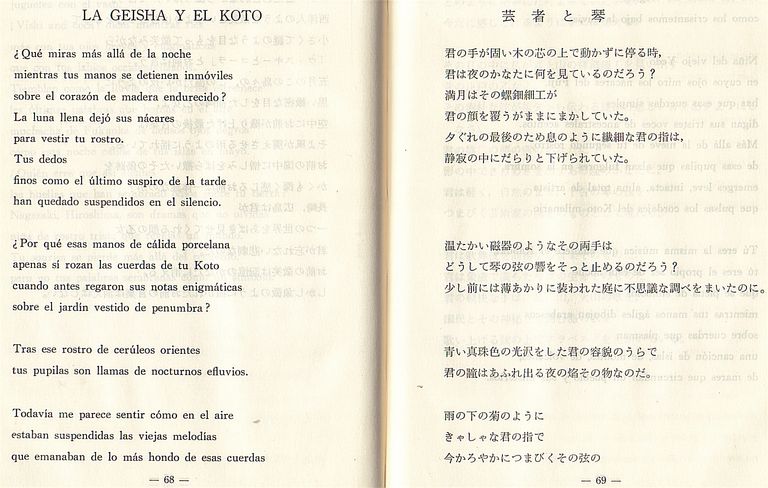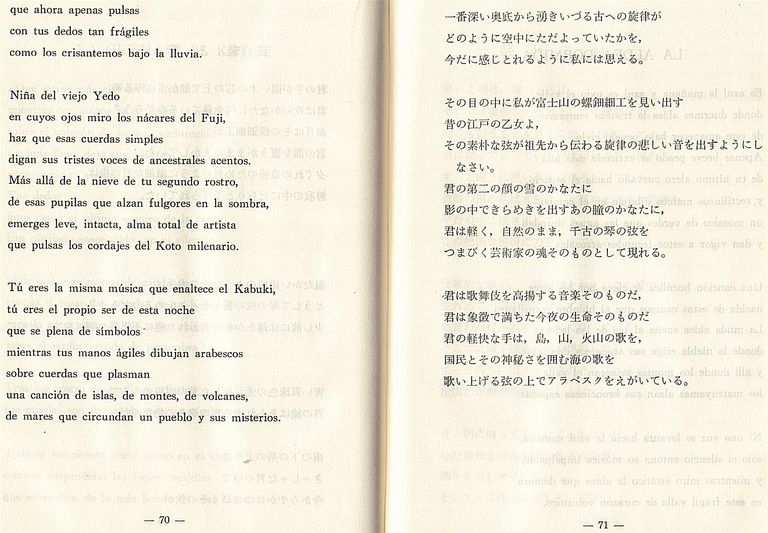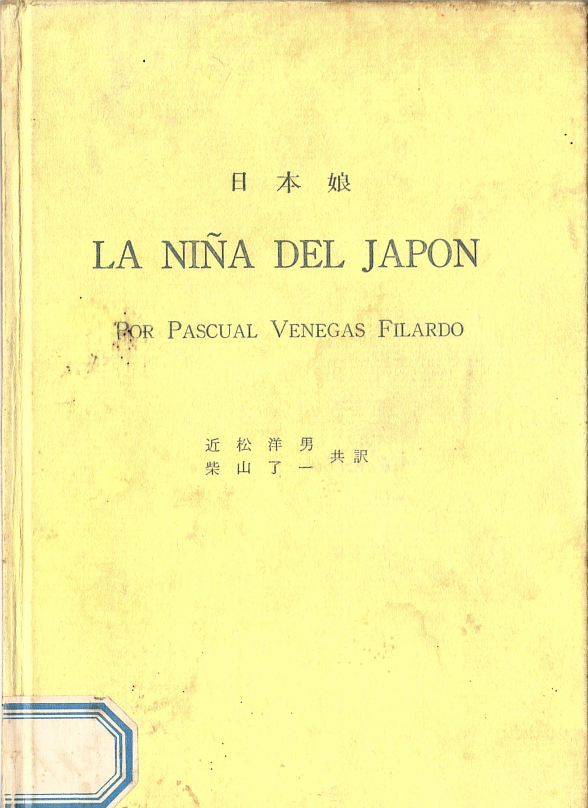I must clarify that the English translation of the poems, originally in Spanish and Japanese, have the terrible weakness that they are simple literal translations, lacking the necessary poetic reworking to adjust the metric, rhyme and cadence that they have in their original languages .
Despite that, the best possible work has been done within my limited capabilities and I hope that publicizing the translation of this work will be of benefit to all.

Source
English: |
The Geisha and the KotoWhat do you see beyond the nightwhile your hands stop motionless on the hardened wooden heart? The full moon left its pearls to dress your face. Your fingers thin as the last breath of the afternoon they have been suspended in silence. Why are those warm porcelain hands they barely touch the strings of your Koto when before they watered their enigmatic notes over the garden dressed in gloom? Behind that face of eastern cerulean your pupils are flames of nocturnal effluvia. I still seem to feel how in the air the old melodies were suspended that emanated from the depths of those strings that now you barely press with your fingers so fragile Like chrysanthemums in the rain Nina from Old Yedo in whose eyes I look at the nacres of Fuji, make those simple strings say their sad voices of ancient accents. Beyond the snow of your second face, of those pupils that raise gleams in the shadow, you emerge light, intact, total artist soul that you strike the strings of the millennial Koto. You are the same music that enhances Kabuki, you are the very being of tonight that is full of symbols while your agile hands draw arabesques on the strings that embody a song of islands, of mountains, of volcanoes, of seas that surround a town and its mysteries. |
Spanish: |
La Geisha y el Koto¿Qué miras más allá de la nochemientras tus manos se detienen inmóviles sobre el corazón de madera endurecido? La luna llena dejó sus nácares para vestir tu rostro. Tus dedos finos como el último suspiro de la tarde han quedado suspendidos en el silencio. ¿Por qué esas manos de cálida porcelana apenas sí rozan las cuerdas de tu Koto cuando antes regaron sus notas enigmáticas sobre el jardín vestido de penumbra? Tras ese rostro de cerúleos orientes tus pupilas son llamas de nocturnos efluvios. Todavía me parece sentir cómo en el aire estaban suspendidas las viejas melodías que emanaban de lo más hondo de esas cuerdas que ahora apenas pulsas con tus dedos tan frágiles como los crisantemos bajo la lluvia. Nina del viejo Yedo en cuyos ojos miro los nácares del Fuji, haz que esas cuerdas simples digan sus tristes voces de ancestrales acentos. Mas alia de la nieve de tu segundo rostro, de esas pupilas que alzan fulgores en la sombra, emerges leve, intacta, alma total de artista que pulsas los cordajes del Koto milenario. Tu eres la misma música que enaltece el Kabuki, tu eres el propio ser de esta noche que se plena de símbolos mientras tus manos ágiles dibujan arabescos sobre cuerdas que plasman una canci6n de islas, de montes, de volcanes, de mares que circundan un pueblo y sus misterios. |
Japanese: |
芸者と琴君の手が固い木の芯の上で動かずに停る時,君は夜のかなたに何を見ているのだろう? 満月はその螺鈿細工が 君の顔を覆うがままにまかしていた。 夕ぐれの瑕後のため息のように娥細な君の指は, 静寂の中にだらりと下げられていた。 温たかい磁器のようなその両手は どうして琴の弦の響をそっと止めるのだろう? 少し前には溥あかりに装われた庭に不思議な調べをまいたのに。 靑い真珠色の光沢をした君の容貌のうらで 君の脑はあふれ出る夜の焰その物なのだ。 雨の下の菊のように きゃしゃな君の指で 今かろやかにつまびくその弦の 一番深い奥底から浼きいづる古への旋律が どのように空中にただよっていたかを, 今だに感じとれるように私には思える。 その目の中に私が宮士山の螺鈿細工を見い出す 昔の江戸の乙女よ, その素朴な弦が祖先から伝わる旋律の悲しい音を出すようにし なさい。 君の第二の顔の雪のかなたに 影の中できらめきを出すあの脑のかなたに, 君は軽く,自然のまま,千古の琴の弦を つまびく芸術家の魂そのものとして現れる。 ■君は歌舞皮を高拗する音楽その4のだ, 君は象徴で満ちた今夜の生命そのものだ 君の軽快な手は,島,山,火山の歌を, 国民とその神秘さを囲む海の歌を 歌い上げる弦の上でアラベスクをえがいている。 |
Due to very different circumstances, I found myself with a book that I had saved, it is a somewhat peculiar poetry book in my library, since it is the bilingual edition in Spanish and Japanese of the Venezuelan poet Pascual Venegas Filardo. The work was published for the first time in 1961, but this one I have here is the 1968 edition, published in Kyoto by Gaikokugo Daigaku and consists of 76 pages, bound in hardcover.
The foreword to this book of poems was written by the Venezuelan Ambassador to Japan, J. M. Pérez Morales. In fact, what is most curious to me is that the book I have was from the embassy library ... don't go after me with the excommunication order for stealing books, I really didn't! I think the book was disincorporated or something similar, and then it passed through several hands until it came to me.
I have, to some extent, some affinity with some traits of Eastern cultures, there are several things that I like and in recent times I dusted off a few of them. I thought about checking if the book was available to share, but I only found fragments online, hence the idea of digitizing it and applying OCR to it to share it as it is in print, in both languages. Later on a suggestion from a reader, I decided to translate it into English, even if it is just to give an idea of what the beautiful poems in this book want to express.
Sources:




Much more than a browser. Enjoy private, safe and fast browsing with Brave